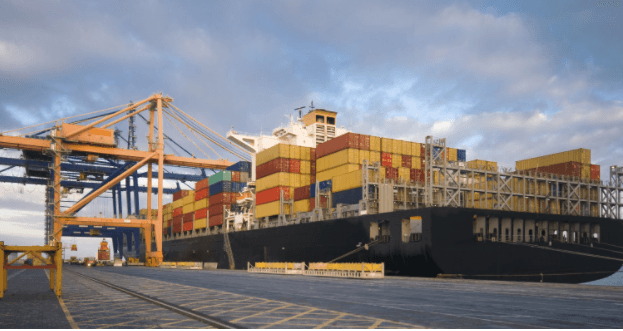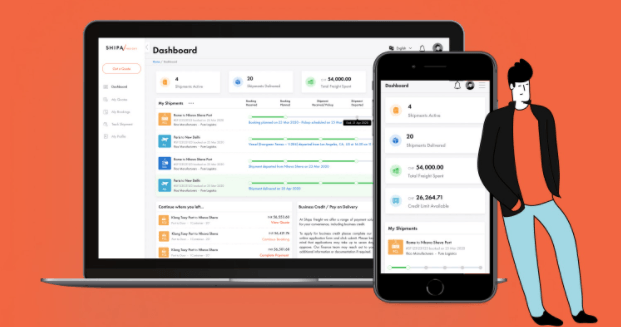
Container Shipping to South Africa
Get information and quotes for FCL and LCL shipping

Just like in any other country, shipping a container to South Africa comes with its own set of technicalities, processes, and requirements. Without an awareness of these, it can be confusing to navigate the shipping process.
If you are thinking of expanding your business’ reach to South Africa, you’ve come to the right place. In this article, we aim to help you with your shipping endeavor with all the information that you need to know to ship a container to South Africa. Here, we outline your options for container shipping, the cost and transit time of your cargo, container capacity you should select, customs clearance requirements, incoterms, and more.
What are your options for container shipping to South Africa?
To ship a container to Africa, your cargo can either go through full container load or less than container load, both of which are options for container shipping.
Less than Container Load (LCL) to South Africa
Less than container load shipping is best if you are shipping small cargo or in small quantities. In this mode of shipment, your goods will be consolidated with consignments from other sellers to be shipped together in one container. Because of the shared shipping, LCL is relatively more economical compared to full container load. But the catch is that the process can take a little longer.
Full Container Load (FCL) to South Africa
In full container load, on the other hand, there is no consolidation process involved. This is because your goods will be shipped in isolation. You have the entire container at your disposal, hence, FCL is best for large cargo or if you are shipping in large quantities. FCL allows you to enjoy a more exclusive form of shipping. However, it can be more expensive compared to LCL.
How much does it cost to ship a container to South Africa?

The cost of your shipment to South Africa would be dependent on a variety of factors. These include:
- Type of goods you are shipping
- Your choice of shipping service (LCL or FCL)
- Weight of your cargo
- Volume of your cargo
- Distance between your port of origin and destination
- Movement type (door-to-door, port-to-port, etc.)
If you need a more accurate estimate of your shipping costs, request a quote from your freight forwarder.
What type of cargo can be sent in a container?
Because container shipping requires ocean freight as the mode of shipment, you actually have more liberty when it comes to what type of cargo you can ship. There are fewer limitations in ocean freight compared to air freight, so you can ship any type of goods that you need.
The only catch is that you should be aware of the prohibited and restricted goods for import in South Africa. Otherwise, you may run into problems with customs. Some types of goods may require additional licenses, permits, or certifications before they can be imported in South Africa.
How long does it take to ship a container to South Africa?

The transit time for your cargo is also dependent on a variety of factors, which include the distance between your origin country and South Africa, the route of your ship (whether direct or has multiple stops), and the choice of ocean freight shipping you select.
It can take anywhere from four to 65 days for your parcel to arrive in South Africa. Below are some estimated transit times from ports in the U.S.
Country of Origin|Port of Origin|*Estimated Transit Time| ------- | ---------------- | ---------------- |----------: America|Charleston|65 days America|Baltimore|64 days America|Norfolk|62 days America|Charlotte|4 days America|Greensboro|4 days America|Huntsville|4 days
What container capacity do I need for my cargo?
Containers for ocean shipping come in various sizes, ranging from 20 feet to 45 feet. Most ports have the following sizes available:
- 20 foot - 33.2 CBM
- 40 foot regular - 63.5 CBM
- 40 foot high cube - 76.4 CBM
- 45 feet high cube - 86 CBM
The container capacity that you choose would depend on the size and volume of your goods. But we recommend that if you select LCL, your goods do not occupy more than half the container space. Otherwise, your shipping cost would be relatively the same as FCL shipping costs, so it would be more economical to simply select FCL as your mode of shipment.
When it comes to FCL, however, you don’t have to worry about the size and volume of your cargo. Because the whole container is yours, you are free to utilize the entire space for your cargo.
Which mode of ocean shipping should I choose, FCL, LCL, or Break Bulk?
The right mode of ocean shipping for you would depend on your cargo, as well as your priorities in the shipping process. To help you make the right decision, here are some pointers to consider:
Less Than Container Load (LCL) Shipping to South Africa
LCL is the right mode of ocean shipping for you if your cargo is:
- Small in size or quantity
- Not delicate or fragile
- Suitable for frequently movement or handling
- Suitable for consolidation with other cargo
- Not urgently needed in South Africa
Full Container Load (FCL) Shipping to South Africa
On the other hand, FCL may be a better option if your cargo is:
- Large, bulky, heavy, or overweight
- Fragile, delicate, or perishable
- Safer in isolation
- Not suitable for frequent handling and movement
- Expected in South Africa within a shorter time period
Break Bulk
If your cargo is too large and cannot fit in a single container, your freight forwarder may recommend break bulk shipping. In this mode of shipment, your goods will be separated and shipped in different containers.
Customs Clearance in South Africa
Before your goods can be accepted in South Africa, they will go through customs clearance. This process requires you to submit some essential documents, including:
- Commercial invoice
- Letter of credit/ other payment terms
- Packing list
- Certificates of origin
- Import licenses
- Bill of lading or airway bill, provided by Shipa Freight
We have a full documents list that you can refer to for examples of these required customs documents.
Which Incoterms would be the right choice for my shipment?
Using the right Incoterms is crucial in international shipping because it outlines your liabilities and responsibilities in the shipping process. The best Incoterms to use are the following:
Best Incoterms for Exporters
CPT (Carriage Paid To): The seller must bring the goods to the agreed destination and carry out a contract of carriage. The seller is liable until the goods have been handed to the carrier.
CIP (Carriage and Insurance Paid To): Similar responsibilities as CPT, but with the added requirement on the seller’s part to obtain insurance.
DAP (Delivered At Place): The seller should deliver the goods to the buyer’s selected location and is responsible for the majority of the shipping process.
DDP (Delivery Duty Paid): The seller is responsible from the beginning to the end of the shipping process. This leaves the buyer with minimal responsibilities.
FCA (Free Carrier): The seller must deliver the goods to the carrier and shoulder the costs of customs.
Best Incoterms for Importers
FCA (Free Carrier): The seller must deliver the goods to the carrier and shoulder the costs of customs.
EXW (Ex Works): More responsibility is put on the buyer’s part, from picking up the goods at the seller’s premises or warehouse to arranging transport.
Processes to follow to ship a container to South Africa

To ship a container to Africa is a complex process, so we recommend that you engage a freight forwarder to assist you with the process. Your freight forwarder can help you schedule your shipment, accomplish customs requirements, and more.
If you select LCL as your chosen mode of ocean shipping, your goods will be consolidated in the container freight station with other consignments. This process is not required in FCL. All shipments then are loaded into the vessel and undergo fumigation to get rid of insects, pests, and other harmful organisms.
When the goods reach the port of destination in South Africa, they will go through customs clearance. With the right documents, this process should be quick and easy. After they are cleared by customs, you can pick up your goods in the port of destination. If you select a movement type, such as door-to-door or port-to-door, your goods will be delivered to your nominated address.
Main container ports of arrival in South Africa
Cape Town
The Port of Capetown is located in Table Bay, South Africa, along one of the busiest trade routes in the world. Because of this, it is considered one of the busiest ports in the nation. The majority of goods handled by the Port of Cape Town include fruits.
Owned By: Transnet National Ports Authority Annual Container Volume: >719,825 TEUs UN/LOCODE: ZACPT
Durban
The Port of Durban is the largest and busiest port in South Africa. Also called Durban Harbour, it has the fourth-largest container terminal in the South and generates 60% of Africa’s revenue.
Owned By: MSC Cruises SA Annual Container Volume: >4.5 million TEUs UN/LOCODE: ZADUR
Port Elizabeth
The Port of Elizabeth is located in Eastern Cape, South Africa, the nation’s most populous city. It is a major seaport that rests in a cultural, financial, and economic center.
Owned By: APM Terminals Annual Container Volume: >2.3 million TEUs UN/LOCODE: ZAPLZ
Why Ship a Container to South Africa With Shipa Freight?

Shipping a container to South Africa can be complex and complicated. Luckily, you are backed by a reliable freight forwarder, Shipa Freight. Shipa Freight is a digital-first freight forwarder that offers the functionalities of traditional freight forwarding services but with the convenience of modern technology. We have a digital platform that you can access from the comfort of your smartphone to:
- Request and compare quotes
- Start a shipment
- Manage your shipments
- Track your cargo
- Access customer support
- Settle payments
- And more
Get started with a modern approach to shipping with Shipa Freight. Get a quote today.


